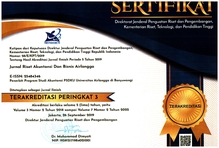INFLUENCE REWARD AND CONTROL SYSTEMS ON CORPORATE PERFORMANCE: AN ORGANIZATIONAL CULTURE PERSPECTIVE
Downloads
This study aims to examine influence of reward systems, process and structure management control systems on organizational performance, and to analyze the moderating role of organizational culture. Sample is 205 respondents representing restaurant businesses in the JABODETABEK are were selected by purposive sampling. Data were collected through structured questionnaires and analyzed using Structural Equation Modeling with Partial Least Squares (SEM-PLS). The results showed that the reward system (β = 0.399; t = 4.996; p = 0.000) and process management control systems (β = 0.095; t = 4.888; p = 0.000) a positive and significant influence on organizational performance. In contrast, the structural management control system did not influence (β = 0.044; t = 0.677; p = 0.499). Furthermore, organizational culture failed to moderate the influence of reward systems, PMCS, and SMCS on performance, with p-values of 0.898, 0.874, and 0.909, respectively. The Adjusted R² value of 0.564 indicates that 56.4% of the variation in organizational performance is explained by the changes in the independent variables included in the model. The results highlight the importance of aligning reward systems and control processes with the organizational context. Practically, the findings guide restaurant managers to implement transparent reward systems and adaptive control processes to improve performance. This study is limited by its focus restaurants in a specific region and its reliance on self-reported survey data, which may introduce response bias. Future research should consider expanding the sample across industries and regions, integrating qualitative methods, and examining other contextual variables that may strengthen the moderating role of organizational culture.
Downloads
Copyright (c) 2025 Tutik Siswanti, Sekar Mayangsari

This work is licensed under a Creative Commons Attribution-ShareAlike 4.0 International License.

























